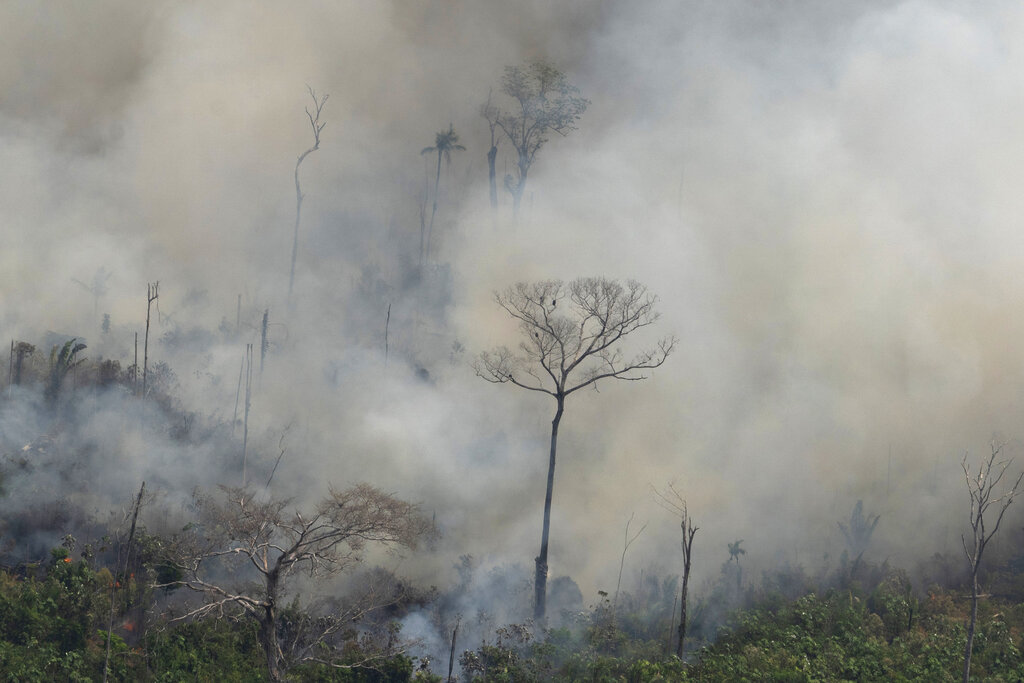
Fire consumes an area near Porto Velho, Brazil, Friday, Aug. 23, 2019. Brazilian state experts have reported a record of nearly 77,000 wildfires across the country so far this year, up 85% over the same period in 2018. (AP)
PORTO VELHO, Brazil — Under increasing international pressure to contain fires sweeping parts of the Amazon, Brazilian President Jair Bolsonaro on Friday authorized use of the military to battle the massive blazes.
Brazilian forces will deploy starting Saturday to border areas, indigenous territories and other affected regions in the Amazon to assist in putting out fires for a month, according to a presidential decree.
The armed forces will collaborate with public security and environmental protection agencies, the decree says. Bolsonaro’s office confirmed that he had signed it.
Bolsonaro has previously described rainforest protection as an obstacle to economic development, sparring with critics who note that the Amazon produces vast amounts of oxygen and is considered crucial in efforts to contain global warming.
An Associated Press journalist who traveled to the Amazon region on Friday saw many already deforested areas that had been burned.
Charred trees and fallen branches were seen around Porto Velho, the capital of Rondonia state, which borders Bolivia. In some instances, the burned fields were adjacent to intact livestock ranches and other farms, suggesting the fires had been managed as part of a land-clearing activity.
A large column of smoke billowed from one fire, and smoke rose from a couple of nearby wooded areas. Life appeared normal in Porto Velho. However, visibility from the windows of an arriving airplane was poor because of smog enveloping the region.
Small numbers of demonstrators gathered outside Brazilian diplomatic missions in Paris, London, Geneva and Bogota, Colombia, to urge Brazil to do more to fight the fires. Larger protests were held in Uruguay and Argentina. Hundreds also protested in Chile, Ecuador and Peru.
Neighboring Bolivia and Paraguay have also struggled to contain fires that swept through woods and fields and, in many cases, were set to clear land for farming. About 7,500 square kilometers (2,900 square miles) of land has been affected in Bolivia, according to Defense Minister Javier Zavaleta.
On Friday, a B747-400 SuperTanker arrived in Bolivia and began flying over devastated areas to help put out the fires and protect forests. The U.S.-based aircraft can carry nearly 76,000 liters (20,000 gallons) of retardant, a substance used to stop fires.
Some 370 square kilometers (140 square miles) have burned in northern Paraguay, near the borders with Brazil and Bolivia, said Joaquín Roa, a Paraguayan state emergency official. He said the situation has stabilized.
Close to 20% of the Amazon has already been deforested, according to Thomas Lovejoy, a George Mason University environmental scientist.
“I worry that the current deforestation will push past the tipping point leading to massive loss of forest and biodiversity,” Lovejoy wrote in an email to The Associated Press. He said Brazil is “turning its back” on past environmental achievements, including the 1992 Earth Summit, and has proposed infrastructure projects that will accelerate the challenge of climate change.
“Fires are directly burning into the Amazon rainforest and that releases the carbon stored in those trees,” said Doug Morton, a NASA scientist. “The carbon then enters the atmosphere as carbon dioxide or methane, where it contributes to the greenhouse gases that are causing climate change, bringing us a warmer and a drier planet.”
Morton said there is now “an uptick in the pressure against the remaining Amazon forest, to expand agriculture production in areas that are the leading edge in the deforestation frontier.”
Fires are common in Brazil in the annual dry season, but they are much more widespread this year. Brazilian state experts reported nearly 77,000 wildfires across the country so far this year, up 85% over the same period in 2018.
Just over half of those fires have occurred in the Amazon region. Brazil contains about 60% of the Amazon rainforest.
U.S. President Donald Trump said Friday that he spoke with Bolsonaro.
“Our future Trade prospects are very exciting and our relationship is strong, perhaps stronger than ever before,” Trump tweeted. “I told him if the United States can help with the Amazon Rainforest fires, we stand ready to assist!”
In escalating tension over the fires, France accused Bolsonaro of having lied to French leader Emmanuel Macron and threatened to block a European Union trade deal with several South American states, including Brazil. Ireland joined in the threat.
The specter of possible economic repercussions for Brazil and its South American neighbors show how the Amazon is becoming a battleground between Bolsonaro and Western governments alarmed that vast swathes of the region are going up in smoke on his watch.
Ahead of a Group of Seven summit in France this weekend, Macron’s office questioned Bolsonaro’s trustworthiness.
Brazilian statements and decisions indicate Bolsonaro “has decided to not respect his commitments on the climate, nor to involve himself on the issue of biodiversity,” Macron’s office said.
It added that France now opposes an EU trade deal “in its current state” with the Mercosur bloc of South American nations that includes Brazil, Argentina, Paraguay and Uruguay.
German Chancellor Angela Merkel views the fires as “shocking and threatening,” according to government spokesman Steffen Seibert.
Argentina, which is struggling with rising poverty and austerity measures, has offered to send emergency workers to Brazil and Bolivia to help put out the fires. Chile has also offered aid.
The Brazilian government has said European countries are exaggerating Brazil’s environmental problems in order to disrupt its commercial interests. Bolsonaro, who has said he wants to convert land for cattle pastures and soybean farms, said it was difficult to curb increasing deforestation with limited resources.
“It’s not easy to fight deforestation, our Amazon area is bigger than all of Europe,” he said. “We’ll do what we can to fight this crime.”
https://newsinfo.inquirer.net/1156953/ap-explains-the-causes-and-risks-of-the-amazon-fires